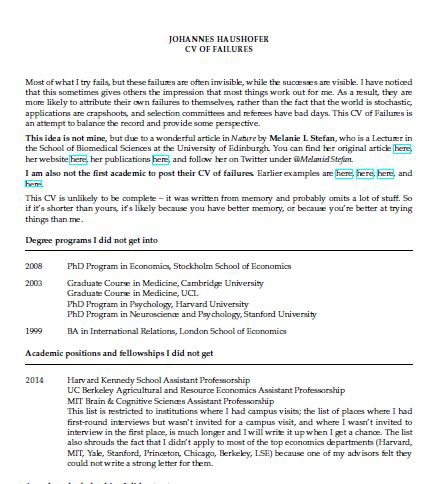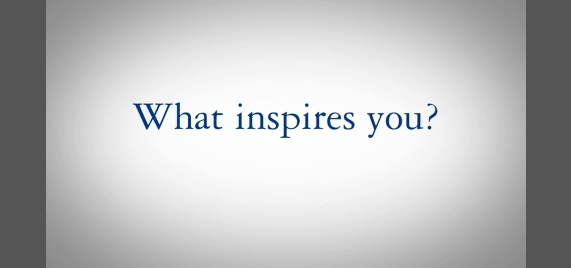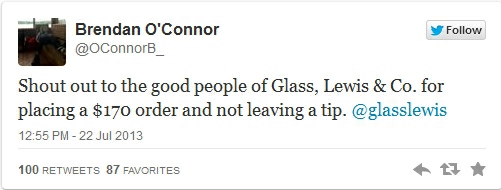J.P. Morgan Eases Its Dress Code
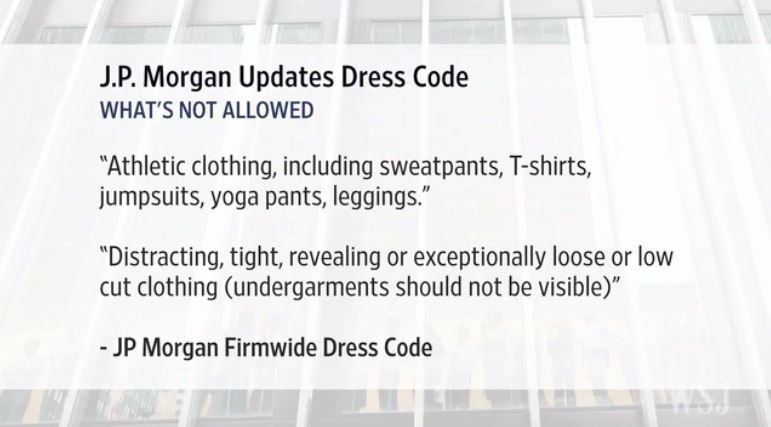 J.P. Morgan is following other companies and easing its dress policy. As the biggest asset holder, the bank may lead a trend among financial services firms. Wall Street banks are known for their pinstripe suits and ties, but CEO Jamie Dimon is often seen dressing down.
J.P. Morgan is following other companies and easing its dress policy. As the biggest asset holder, the bank may lead a trend among financial services firms. Wall Street banks are known for their pinstripe suits and ties, but CEO Jamie Dimon is often seen dressing down.
An email to staff explained the new policy, which allows khaki pants and polo shirts but not halter tops, and encourages dressing up for client meetings. The company already had a weekend dress policy in place.
Barclays implemented a similar policy last year but had to clarify: no flip flops. And J.P. Morgan warned with this change that it's not the same as weekend casual, which could mean jeans and more causal wear.
A man I know complained about his not-for-profit organization's policy that disallowed shorts but allowed skirts for women. The organization changed its policy and now allows some shorts.
Image source (from WSJ video).
Discussion Starters:
- Why did this take so long? Many of the banks' clients are tech employees in jeans and shorts.
- What's your view of dress policies that disallow shorts but allow skirts?
Princeton Professor Creates "CV of Failures"
Princeton University Professor Johannes Haushofer published his "CV of Failures" on the school website, as he says, "to balance the record and provide some perspective":
Most of what I try fails, but these failures are often invisible, while the successes are visible. I have noticed that this sometimes gives others the impression that most things work out for me. As a result, they are more likely to attribute their own failures to themselves, rather than the fact that the world is stochastic, applications are crapshoots, and selection committees and referees have bad days.
This list includes programs he didn't get into, journals that rejected his articles, and research funding he didn't get.
The idea came from an article in Nature by Melanie I. Stefan, a lecturer in the School of Biomedical Sciences at the University of Edinburgh.
Haushofer tweeted, "Dear everyone writing your own CV of failures: just to point out I'm not aware of scientific evidence saying it does anything good for you." Still, his compilation is an expression of humility and reminds all of us that successes are built on failures. In my view, if we don't have failures, it's possible we're not reaching high enough.
Discussion Starters:
If you wrote a resume of failures, what would you include? Think about the companies that didn't hire you and the schools from which you were rejected.
How do your failures make you feel? Are you still feeling hurt by them, or have you moved past it?
Resume Heat Map: How Recruiters Spend Their Six Seconds
TheLadders tracked recruiters' eye movements when reviewing resumes. Using a heat map, we can see what this group looked at in the mere six seconds they spent reviewing your life's work.
Business Insider posted a video explaining the results. The biggest lesson is that your current and previous positions and education should be clear and easy to see. White space and font size matter.
What can we learn from the results?
- Recruiters scan the name and then current and previous jobs. Jobs should be prevalent under a section called Professional Experience or Work Experience. The results reinforce that you should highlight positions clearly with font enhancements, such as bold type. Also, this may be another case for taking positions with well-known companies. Then, consider how easily your position title can be read.
- Education was the next section scanned in the resume. Again, the name of a school and degree should be prominent in this section.
- What about other skills, volunteer work, etc.? These should still be included for the next round of the selection process: a second screen or an interview. But, as we already know, these can be placed at the bottom of the resume and shouldn't take up too much space. If you're debating between including your model airplane hobby and providing a bit more white space and a longer font, I'd go with the latter.
Discussion Starters:
- How can a recruiter assess your qualifications in just six seconds? Try to explain this from a hiring manager's perspective.
- What does this heat map tell you about your own resume? What changes will you make as a result?
Video Interviews on the Rise
According to a Futurestep (Korn Ferry) survey, more companies are interviewing candidates via video, and they are reporting good results. Of the 700 companies surveyed, 75% use video to interview leading candidates, and 50% use it to narrow down the pool. Respondents say video has the following benefits:
- Less time for candidates and hiring managers
- Less travel expense
- Faster process
A representative at Novartis reported, "We have had some impressive results. In the past year, 2,700 video interviews have taken place with a cost-avoidance savings of $475,000 and a reduction in manager interview travel by 220 trips."
Companies are also using set questions for candidates to respond to by video. About 25% are using this method, and another 24% have "employee testimonials or messages from recruiting managers" on their websites.
A representative at Futurestep summed up the value of video on a company's career webpage: "Day-in-the-life videos with real employees can showcase a particular job function or office location. Also, welcome videos from the CEO or hiring managers are easy, inexpensive and effective ways to personalize the job seeker's experience and communicate an organization's employer brand." Deloitte has been including videos for some time, as shown here.
Discussion Starters:
- Some of the benefits seem to focus on organizational fit. How does video contribute to this determination about a candidate and company?
- What do you see as the potential dangers of using video for interviews? What could get lost?
- Have you experienced a video interview? How did it go?
"Tricky" Interview Questions
Business Insider has compiled "17 interview questions that are designed to trick you." 
Depending on your experience and comfort level answering questions, you may find some easier than others. Of course, some of these, technically, would require a yes-or-no answer, but that's not the intent.
- Can you tell me about yourself?
- How would you describe yourself in one word?
- How does this position compare to others you are applying for?
- Can you name three of your strengths and weaknesses?
-
Why do you want to work here?
-
Why do you want to leave your current job?
-
What are you most proud of in your career?
-
What kind of boss and coworkers have you had the most and least success with, and why?
-
Have you ever considered being an entrepreneur?
-
If you could work for any company, where would you work?
-
Why were you laid off?
-
What would you do if you won $5 million tomorrow?
-
Have you ever been asked to compromise your integrity by your supervisor or colleague? Tell us about it.
-
Can you give us a reason someone may not like working with you?
-
Why have you been out of work for so long?
-
How did you make time for this interview? Where does your boss think you are right now?
-
Tell me about a time you disagreed with a company policy.
Discussion Starters:
- Which do you find most difficult and easiest?
- Do you agree with Business Insider's advice for handling each question?
- With a partner, try to answer each question that is relevant to you. How do you do?
Dangers of Talking About Political Beliefs at Work
 A New York Times article warns people about sharing their political leanings in business situations. Alina Tugend lost a sizable account after reacting positively to a news story about President Obama during a meal with a prospective client.
A New York Times article warns people about sharing their political leanings in business situations. Alina Tugend lost a sizable account after reacting positively to a news story about President Obama during a meal with a prospective client.
In the article, she poses these questions:
HERE'S a quiz for the coming campaign season. Which one of these actions could get you disciplined or fired?
A) Hanging political cartoons on your office door.
B) Sending emails to your colleagues soliciting support for a controversial cause.
C) Writing a blog at home stating your opinions about a local campaign and posting it on Facebook.
D) All of the above.
The answer is D. Now, that's not an absolute. It depends on whether you are a private or public employee. It also depends on where you live.
Employees in the private sector have few protections. The First Amendment protects speech from government action, not private employers.
On the other hand, you may have more protection if you belong to a union or work in New York, California, Colorado, North Dakota, or the District of Columbia, all of which protect political beliefs-as long as you don't interfere with business.
Discussion Starters:
- What are you comfortable sharing or not sharing with coworkers?
- Argue for and against protections of political beliefs or actions at work. Try to see the situation from the employer and employee's perspective.
- Should we have a federal law to protect political speech and beliefs as we do for religion? Why or why not?
Job Interviews: "How You Really Sound"
Fast Company created this fun video to show the difference between what a job candidate says and how the interviewer may hear it.
I have to admit I found the "perfectionist" funniest. And the "people person" response reminds me of a video clip from the TV show "The Restaurant." I show it in class to freshmen to encourage them to differentiate themselves during the interview process.
Discussion Starters:
- Admit it, which of the responses have you given? In retrospect, what could you have said or done differently?
- Watch the video clip from "The Restaurant" with successive responses from candidates. Could you see how this might get annoying for a hiring manager?
Which LinkedIn Connections Should I Accept?
 I have a puritanical LinkedIn philosophy: I don't accept an invitation to connect unless I know the person, preferably having met in person. At the other extreme are the "open networkers," who connect with anyone. Somewhere in the middle is Michael O'Donnell, managing director at Thesis Ventures, who offers good advice for people to reject some LinkedIn connections. Let's consider these approaches.
I have a puritanical LinkedIn philosophy: I don't accept an invitation to connect unless I know the person, preferably having met in person. At the other extreme are the "open networkers," who connect with anyone. Somewhere in the middle is Michael O'Donnell, managing director at Thesis Ventures, who offers good advice for people to reject some LinkedIn connections. Let's consider these approaches.
I'm an introvert. I value fewer and deeper relationships. The only reason I have more than 500 connections on LinkedIn is that most are students, a naturally revolving bunch of contacts. Also, I've worked in several organizations as an employee and as an external consultant-I'm old.
If I connected with anyone, I would fear embarrassment when asked to make an introduction. This would upset my introvert sensibilities, forcing me to admit that I don't really have the relationships I claim.
Open networkers (or LIONs, LinkedIn Open Networkers) accept all invitations and often promote their willingness. For people such as recruiters, this strategy may work well to expand potential contacts. However, LinkedIn doesn't support this approach:
"'L.I.O.N.' is a designation used by several user-created groups and individual LinkedIn members to indicate a high level of interconnectivity to other LinkedIn members. This term is not endorsed by LinkedIn. As a reminder, only connect to people you know and trust and only join groups you want your name associated with."
Former LION Karalyn Brown says she regrets adopting this strategy three years ago. Although she has thousands of people in her network, she sees downsides: she's "fair game" for email spam, she finds it difficult to "to find people that I really care about and want to form deeper relationships with," and she's concerned that she looks "indiscriminate."
Being more discriminate is exactly what Michael O'Donnell suggests. Although he accepts connections from people he doesn't know, he'll reject requests for these reasons:
1. No picture or picture is an icon or company logo.
2. Incomplete or sparse profile.
3. Few connections and no recommendations.
4. Your invitation reads, "I'd like to add you to my professional network on Linkedin."
5. You lied about how you know me.
6. Your connection invitation was preceded by an InMail which was essentially a sales pitch for your company or products/services.
7. Your profile title says you are a "visionary" or you have 10,000+ connections...
Discussion Starters:
- What's your philosophy for connecting with people on LinkedIn?
- How does this strategy differ for other sites, such as Facebook, Twitter, and Instagram?
- How have you used LinkedIn for networking?
Starbucks Allows Tattoos
On Monday, Starbucks employees can wear their tattoos proudly-no more long-sleeve cover-ups. The decision comes after a barista amassed more than 25,000 signatures on a petition that describes her goal: "Change the dress code to allow visible tattoos. I believe tattoos are a simple form of self expression and as long as they aren't offensive or explicit, I think we should be able to show off our artwork proudly."
To explain its new dress code, Starbucks created this graphic:
The suggestions sound reasonable enough: "Keep your nails clean," "Pull long hair back," etc. I happen to be writing this at a Starbucks, and the employees look neat and clean. But I'm not counting their earrings or measuring their gauges.
Discussion Starters:
- What's your view of the tattoo policy? Was this the right decision? Why or why not?
- What, if anything, surprises you about the other dress code recommendations?
LEGO Resume Lands an Internship
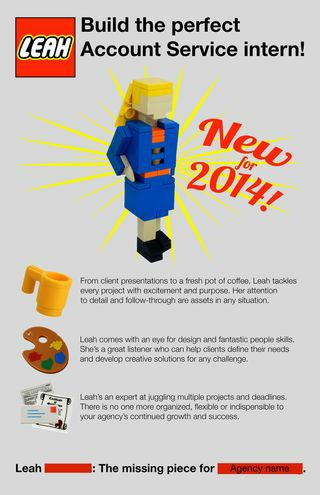 An aspiring advertising intern created a LEGO version of herself in an suit and sent it to prospective employers. Northwestern University student Leah Bowman posted a picture of her creative resume on Imgur.
An aspiring advertising intern created a LEGO version of herself in an suit and sent it to prospective employers. Northwestern University student Leah Bowman posted a picture of her creative resume on Imgur.
Images of the LEGO rendition appeared on 11" X 17" posters with slogans such as, "Build the perfect Account Service intern" and described her skills. Bowman said that the design responded to an agency's call for a persuasive ad.
She wrote on Imgur, "I wanted to stand out to employers, so I made a LEGO set of myself in my interview suit and sent it out to my dream advertising agencies." She also explained her strategy to Mashable:
"Looking for a job can be a bit frustrating at times. I've applied for dozens of jobs and had a handful of interviews, but sometimes there's just another candidate that edged you out. I know I'd be a great addition to any team, but I needed a better way to communicate that rather than just sending in a boring resume."
Her strategy worked: she got an internship in account management at Omnicom's Energy BBDO, an advertising firm based in New York City.
Discussion Starters:
- Someone on Imgur commented, "And then you found out that employers would rather you just be normal." What's your opinion of this comment? Consider the discussion of creative resumes in Chapter 12 of the textbook.
- If you were an employer and had received this, how would you perceive the applicant?
- Assess Bowman's description of her skills on the poster above. How well does she describe her job qualifications? What could she improve?
- On one poster, Bowman wrote, "Build the perfect Account Service intern." Should she have capitalized the job title?
A Handwritten Job Ad
Advertising agency Solve has a new-and old-way of inviting interns to apply for jobs. In a handwritten letter posted around college campuses, Solve asks interns to submit a traditional cover letter and resume by mail. Emphasizing "genuine connections" and a "personal, straightforward" approach, the agency describes its rationale:
"Valuing substance over silliness, Solve refuses to ask candidates to condense resumes into 140 characters, present themselves via fake campaign or funny videos, or answer irrelevant nonsensical questions. Rather, Solve is simply asking for a resume and cover letter…to be sent (via mail) to the agency."
Discussion Starters:
- What's your view of the agency's campaign: refreshing, as gimmicky as a tweet, or something else?
- I'm having trouble reading the letter. Is it just me?
- The letter asks prospective interns to mail in their cover letter and resume. Would you submit something typed or handwritten?
- The letter has a fairly major grammatical error. Can you find it?
CEO Criticizes Stilettos
The CEO of health care company Kanteron Systems tweeted about women wearing high heels at business meetings.
With the hashtag #brainsnotrequired, Jorge Cortell seemed to imply that stilettos pictured in his tweet aren't appropriate for work. In return, he was criticized for sexism. In a Wall Street Journal blog post, "Are Stilettos Too Sexy for Business Meetings," the author described the result:
"The two-day tweet-convo slid from sublime to ridiculous when Mr. Cortell argued that he wasn't referring to sex at all. Heel wearers are dumb because heels are unhealthy for their feet and backs, he tweeted, repeatedly, until Twitter briefly suspended his account."
In his posts, Cortell denied sexism and focused on health issues of high heels:
The WSJ author accused Cortell of "wimping" out, both in his subsequent tweets and in an email response to her:
"If he had stood his ground, I would have stood with him. Five-inch-high platform stilettos call to mind the fetishistic footwear of a cabaret performer. If not quite hooker heels, they are nonetheless best paired with fishnet nylons, a sultry voice, and champagne for two.
"In a business setting, platform stilettos are the female equivalent of a man wearing his shirt unbuttoned to his clavicle underneath his suit jacket.
"Yes, we see them at venture capital conferences and in offices and even board meetings. But let's not pretend they're conservative business footwear. Twitter seems to agree. The social media service on Wednesday labeled Mr. Cortell's heels photo 'sensitive content' – requiring many users to click a permissions button to view it."
Discussion Starters:
- What's your view of wearing stilettos at work? When would they be appropriate and, perhaps, when would they not be appropriate?
- Do you consider Cortell's initial post sexist? Why or why?
- How well do you think he recovered from the criticism?
Employee Quits by Dance Video
Fed up with her job at Next Media Animation, Marina Shifrin resigned byvideo rather than the traditional letter. As of this writing, the video received 13 million views.
One of the company executives, Mark Simon, responded by email to Gawker:
I am Mark Simon, I am the one who hired Marina Shifrin, who danced her way to fame in her resignation video which she sent to Gawker.
Currently, I am one of the senior executives of the group and she reports up to the folks who work for me. Marina actually thinks enough of me to have given me a call the Thursday before she released this to say that she was resigning, which I appreciated. I asked her to tell her bosses, as I took our call to be in confidence. The first her boss saw was the video.
Look, I actually like Marina a great deal. Marina herself has said we are a great company to work for, and I do not think she intended to hurt anyone, but it has happened.
There are a few things I would like just make a point of and if there is an interest I will be happy to be asked any question. (We do not have a PR department and we are wide open to any and all questions).
There is an image now of a sweat shop, we are not. Marina made USD$42k per year. She had a 40 hr work week, 5 days a week. There is no expectation of OT on our behalf, you finish your shift and leave. In our office most folks leave when their shift is up as you work on news flow.
Also we ask journalists to work one month per year on the midnight shift as we just need to cover the shift. We pay a differential of 30% for these hours, which I know are hard hours to work.
Look, we do news animations. We are not investigative reporters. Two international outlets have asked us for comment, and her video is up on nearly 300 sites. We think we have something to say about this and we are hoping Gawker will have us.
I am not looking to slam her, nor am I engaged in anything but trying to help some other managers in their early 30's, understand why the young lady they hung out with just cashiered them. I don't think she meant for it to be seen as so harsh, but we are getting some nasty attacks on our managers, who she says she respects.
I just want any chance to answer any questions, answer anything on Skype or on phone.
I am not spitting nastiness at Marina, but in her 9 months with us we sent her to Hong Kong twice, to Thailand for a media conference, and she just came back a month ago from two weeks in LA and NYC where she was pitching animation stories. She logged 170 hours the last 3 months in creative time working up ideas to pitch. She is a hard worker, but I cannot foresee results or always give her the best story of the day.
We let her talk to all the press she wanted, we encouraged her stand-up, and frankly my folks in Taiwan are a bunch of granola's... They are nice folks. We have 600 employees and I have not one outstanding case in labor tribunal. That is no small feat in Taiwan.
I though Gawker played this fair and so if anyone wants anything we are open.
Thanks
Mark
Employees also posted a video in response:
Discussion Starters:
- What are the potential risks and rewards for Shifrin? Consider her position and industry?
- How do you assess Simon's response?
- Correct Simon's many typographical and punctuation errors.
Food Truck Employee Gets Fired for a Tweet
Unhappy about not receiving a tip, a food truck employee let loose on Twitter:
Employees at Glass Lewis & Company, a consultancy specializing in corporate governance, ordered $170 worth of grilled cheese sandwiches and milkshakes but didn't leave a tip. Brendan O'Connor, the Milk Truck employee, chronicled the incident on his blog:
"I was making sandwiches, another worker took the order and a third made the milkshakes and watched the grills. A line grew while we worked, and we had to tell other customers that their lunch orders would take longer than usual. They paid; I asked my co-worker who was dealing with the money how much of a tip they'd left. They had left actually no tip at all. (They had paid with a card so we checked the cash tips to see if there'd been a bump. There hadn't.)
"I asked some of the group as they were picking up their orders if they had intended to not tip. They hemmed and hawed and walked away.
"Well. I could have not said anything. I could have made it a subtweet. I probably should have made it a subtweet. But I didn't, because of some misguided notions about having 'the courage of your convictions,' or whatever."
O'Connor explains that he was fired by the owner after someone from Glass Lewis complained about being "tip-shamed." O'Connor's argument is that his employer uses social media feedback to monitor employees' performance, so why shouldn't he use social media to "advocate for a more civil exchange between worker and consumer?"
Well, no companies want their customers embarrassed publicly, and many have policies in place to this effect. Milk Truck managed to restore its credibility with an apology tweet, accepted by Glass Lewis:

But Twitter is still abuzz with the ethics of the situation. Did Milk Truck do the right thing by terminating O'Connor? Was O'Connor's tweet justified? Does Glass Lewis owe an apology? What's your view?
More Data on Social Recruiting
 The Society for Human Resource Management published a new study confirming much of what we know about social recruiting and offering some surprising data, too.
The Society for Human Resource Management published a new study confirming much of what we know about social recruiting and offering some surprising data, too.
It's no surprise that most of the 651 respondents, whose job includes staffing, use LinkedIn, Facebook, and Twitter-in that order-to find "passive" job candidates. This is consistent with other survey data in the past couple of years. Eighty percent of respondents use these sites; those who don't cite legal concerns, such as finding out someone's age.
A surprising 57% of companies don't have policies in place for using social networking sites to screen candidates, and 72% have no intention of establishing a formal policy within the next 12 months.
Discussion Starters:
- Why don't companies have a policy for screening candidates online? What are the potential drawbacks of creating a policy?
- What are the potential ethical considerations of screening candidates on LinkedIn, Facebook, and Twitter? How do these three sites differ as screening tools?
Tweet for Jobs
We know that "social recruiting" is increasingly common, with 73% of employers responding to a Jobvite survey reporting that they have hired someone online. But how does this work on Twitter, through which 15% of the 73% had hired someone? The Wall Street Journal published an article that explains some of the recruiter's and job seeker's perspective.
 As funny as it seems to tweet your qualifications within 140 characters, more employers are encouraging people to respond to job postings on Twitter. Boston network-infrastructure firm Enterasys tried this approach and found success. The company's chief marketing officer said, "I am fairly certain I am going to abandon the resume process. The Web is your CV and social networks are your references."
As funny as it seems to tweet your qualifications within 140 characters, more employers are encouraging people to respond to job postings on Twitter. Boston network-infrastructure firm Enterasys tried this approach and found success. The company's chief marketing officer said, "I am fairly certain I am going to abandon the resume process. The Web is your CV and social networks are your references."
Other employers report following prospective candidates to evaluate their interactions. And in many situations, although the initial contact happens via tweets, candidates include links to more substantive resumes and social media profiles.
One optimist, Kathryn Minshew, founder of career website TheMuse.com, said that the tweet is "the new elevator pitch."
Discussion Starters:
- How optimistic are you about companies' recruiting via Twitter?
- How could you see publicizing your qualifications and career interests on Twitter? What are the potential downsides for you personally and professionally?
Good Grammar Improves Job Prospects
A study by Grammarly examined 100 LinkedIn profiles and found that good grammar improved job prospects:
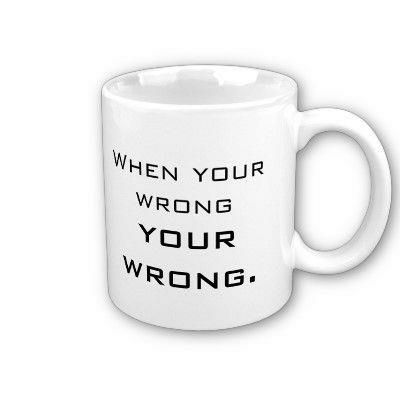 "Professionals with fewer grammar errors in their profiles achieved higher positions.
Those who failed to progress to a director-level position within the
first 10 years of their careers made 2.5 times as many grammar mistakes
as their director-level colleagues.
"Professionals with fewer grammar errors in their profiles achieved higher positions.
Those who failed to progress to a director-level position within the
first 10 years of their careers made 2.5 times as many grammar mistakes
as their director-level colleagues.
"Fewer grammar errors correlate with more promotions. Professionals with one to four promotions over their 10-year careers made 45% more grammar errors than those with six to nine promotions in the same time frame.
"Fewer grammar errors associate with frequent job changes. Those who remained at the same company for more than 10 years made 20% more grammar mistakes than those who held six jobs in the same period. This could be explained in a couple of ways: People with better grammar may be more ambitious in their search for promising career opportunities, or job-hoppers may simply recheck their résumés between jobs."
One-hundred is a small sample size, but the results aren't surprising. In another survey, 11% of employers who checked applicants' social media posts did not hire them because of "poor communication skills." I might assume that included poor grammar.
Although few spelling mistakes were found on LinkedIn profiles, probably because of the spell-check feature, careless and grammatical errors could be a dealbreaker for your future employer.
Assignment Ideas:
- Review another student's LinkedIn profile. Do you find any errors? If so, how does this affect your opinion of him or her as a job candidate?
- Look at your Facebook page, if you have one. If you were a potential employer reviewing the page, what would be your impressions?
- Consider making changes to these sites and other social media spaces that employers may visit.
Is Yahoo!'s Hiring Process Too Long?
 Marissa Mayer, Yahoo!'s new CEO, is criticized once again. Recently, she made headline news for asking remote employees to work in an office. Now, her employees are taking issue with what they consider to be a long hiring process.
Marissa Mayer, Yahoo!'s new CEO, is criticized once again. Recently, she made headline news for asking remote employees to work in an office. Now, her employees are taking issue with what they consider to be a long hiring process.
Business Insider outlines her process, which includes teams of people interviewing each candidate and Mayer's final approval of every new hire. One employee complained to Business Insider, "It's a big waste of senior people's time to be sitting in all these interviews and generating all this paperwork & so on. And, teams suffer and productivity suffers while we endure the endless waits to bring people on."
Apparently, forms have to be filled out, and decisions can wait for weeks. Employees worry that Yahoo! is losing good candidates because offers aren't extended quickly enough.
But some of Mayer's requirements aren't unusual for technology companies. Google CEO Larry Page approves every hire, and Tim Page, AOL CEO, did the same when he first joined the company.
A little more control might be just want Yahoo! needs. Some say expenses are too high, and perhaps Yahoo! hasn't hired top talent in the past. Can we blame Mayer for acting like, well, a CEO?
Discussion Starters:
- As a job candidate, how long do you think the hiring process should take, from when you send your resume to when you receive a job offer?
- How would you handle a situation where you're waiting to hear from your first-choice employer and receive another offer?
More Creative Ways to Job Hunt
Finding a new job is getting more and more social-and bizarre. A social media strategist posted an ad on Facebook and received "multiple offers."
Ian Greenleigh, author of The Social Side Door: How Social Media Has Rewritten the Rules of Access and Influence, tried a second experiment. Billing himself as a "Future Googler," he targeted current Google employees for his next Facebook ad. Forty-eight clicked on the link.
One in six job seekers say that social media helped them get their current job. "Social resumes" today go beyond having a LinkedIn profile. Rather, they represent your entire online presence.
On the other hand, creative tactics don't have to involve technology. One inventive marketing professional distributed resume chocolate bars to potential employers.
Discussion Starters:
- Which of these ideas might you try? What are the risks of each?
- What other creative approaches have you taken to search for a job?
A Resume to Set You Apart
Philippe Dubost is one clever web product manager. Rather than producing a boring, print resume or an overwhelming online resume, he designed his to resemble an Amazon product page.
The resume has attracted a lot of attention, leading him to post an "Instant update" on his Amazon page: "Hi everyone, thank you so much for the overwhelming (and unexpected!) nice feedback! I'll share what happens on twitter." Dubost also has appeared on news programs to talk about his "Amaz-ing" resume.
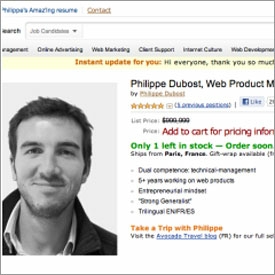 When asked why Dubost has so many one-star reviews, he tweeted: "lots of ex-girlfriends."
When asked why Dubost has so many one-star reviews, he tweeted: "lots of ex-girlfriends."
Here are two other recent attempts to get noticed on the job market:
Discussion Starters:
- What's your view of Dubost's resume? Gimmicky, clever, or something else?
- What risks would you be willing to take to get hired?
- For what industries or type of positions would this approach be most and least effective?



